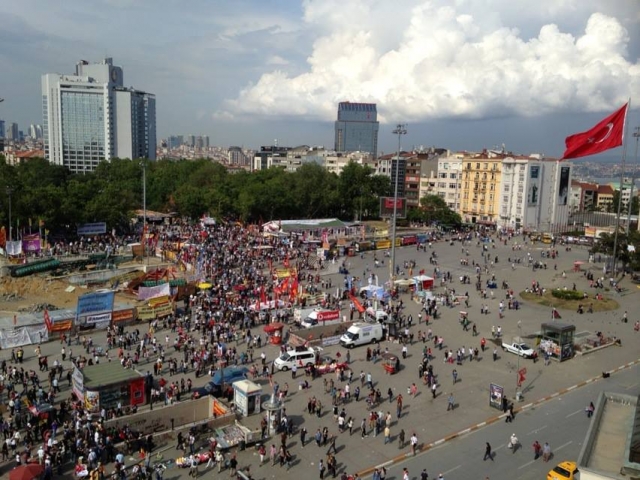Title photo: REUTERS/Stoyan Nenov
Anastasia Balezdrova
Six days after they started, the protests in Istanbul and other Turkish cities are not losing their dynamics. Thousands of Turks continue to protest in the streets and a commission of the "occupiers" in Taksim Square, where it had all begun, met today with Deputy Prime Minister Bulent Arinc and President Abdullah Gul.
 Evangelos Kehriotis, who has a PhD of Historical Sciences and is Assistant Professor in the Department of History at Bogazici University, is talking with GRReporter about the future of the protests and their impact on the politics and governance of the country.
Evangelos Kehriotis, who has a PhD of Historical Sciences and is Assistant Professor in the Department of History at Bogazici University, is talking with GRReporter about the future of the protests and their impact on the politics and governance of the country.
Mr. Kehriotis, what is the situation in Istanbul today? Are the protests continuing? Are the police still so aggressive? Has the information on killed and injured protesters been confirmed? On the other hand, how is daily life in the city now?
As far as I know, two people have been killed. The police have completely succumbed already. Last night, I spent a few hours at the place of the protests. The area around Taksim Square and the whole of Istiklar Avenue in the neighbourhood of Beyoğlu were full of people. There are no policemen there. The police forces are deployed further down, near the seafront. According to what I read in the morning, there were no clashes last night.
The region is totally free and the fact that the absence of the police is strengthening the relations between the people is very impressive. There is no tension between them. Various small structures such as a small clinic and a restaurant have been organized in the park. Now, a library is being created. The atmosphere is very festive; a symphony orchestra performed a small concert yesterday. People with a different ideology and political orientation, who, until yesterday, were in conflict, are now together. There are some disputes for sure but there is no tension at all.

Photo: REUTERS/Yannis Behrakis
Life in the city continues as usual. There are protests and processions in various districts but I have no information on conflicts there.
What are the reasons for this rebellion? In recent years, Turkey has achieved huge economic growth and logically, the people are living better than a few years ago. In this case, what is it that has made them go out into the streets to protest?
The shortest answer to this question is that economic development is not always a guarantee for a better life.
The more analytical response is as follows: In recent years, Turkey has achieved incredible economic development, improved its infrastructure and enhanced its international position. The indicators here are very different from those in southern Europe. The unemployment rate is not high but on the other hand, the conditions of employment are not the best for the majority of people. Wages are low, the standard of living is high and so, many people are struggling with the costs, although they are working.
The second point is that this government has been in power for many years now and this fact itself causes tension because there is no opposition force that is able to threaten the government.
Thirdly, a number of laws and bans have been adopted that directly affect the freedom of expression. It is known that many journalists have been in jail for years and the situation with many students is similar. There are various bans related to lifestyle. A ban on alcohol consumption has been recently adopted. Before that, there were rules for the behaviour of women which certainly restricted them in many ways. There is also a part of society that believes that the old principles of Kemalism are being violated whereas others disagree with the attempts to solve the Kurdish issue, which should have been the main topic in the Turkish public space. All these people, each of them in compliance with their own principles, are very angry. This resentment was the reason for the outbreak of this rebellion. In addition, I would say that they are angry at the government less and more at Prime Minister Recep Tayyip Erdogan.
In this connection, the logical question arises of why the Prime Minister has decided to intervene in the individual lives of people in this way. Isn’t this self-destroying for him?
The success of this government is based on the fact that it has been able to isolate and marginalize the once all-powerful military regime and the old way a smart Turkish bourgeoisie perceived the world. It has been able to free the minds of the majority of the population – its conservative and religious elements – that follow certain rules in their daily lives, assuming, however, that no one should interfere in the lives of others. So, this is how it was in the early days of the ruling of the party.
Now, the government is exactly on the opposite shore. Moreover, it shows its desire to satisfy that part of society that was considered repressed, such as women who were not allowed to attend universities or to go to work with headscarves. The cabinet is demonstrating its will to expand and impose this conservative way of life that, until recently, was semi-legal among other members of society too. This, actually, poses huge problems, because, in this way, the government is turning against the principles that it itself had proclaimed. This is the end of the legitimacy of the political language of the cabinet, which it used all these years.